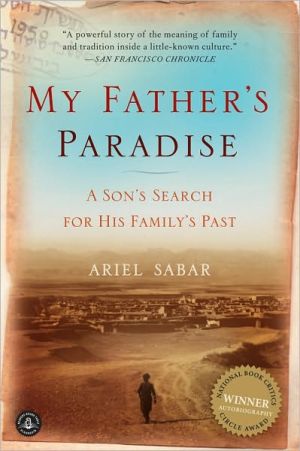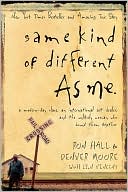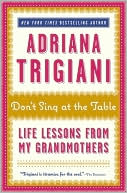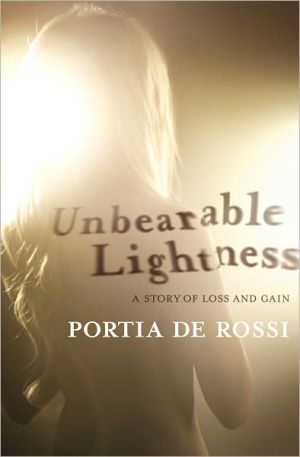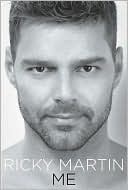My Father's Paradise: A Son's Search for His Family's Past
In a remote corner of the world, forgotten for nearly three thousand years, lived an enclave of Kurdish Jews so isolated that they still spoke Aramaic, the language of Jesus. Mostly illiterate, they were self-made mystics and gifted storytellers and humble peddlers who dwelt in harmony with their Muslim and Christian neighbors in the mountains of northern Iraq. To these descendants of the Lost Tribes of Israel, Yona Sabar was born. \ Yona's son Ariel grew up in Los Angeles, where Yona had...
Search in google:
In a remote corner of the world, forgotten for nearly three thousand years, lived an enclave of Kurdish Jews so isolated that they still spoke Aramaic, the language of Jesus. Mostly illiterate, they were self-made mystics and gifted storytellers and humble peddlers who dwelt in harmony with their Muslim and Christian neighbors in the mountains of northern Iraq. To these descendants of the Lost Tribes of Israel, Yona Sabar was born. Yona's son Ariel grew up in Los Angeles, where Yona had become an esteemed professor, dedicating his career to preserving his people’s traditions. Ariel wanted nothing to do with his father’s strange immigrant heritage—until he had a son of his own. Ariel Sabar brings to life the ancient town of Zakho, discovering his family’s place in the sweeping saga of Middle-Eastern history. This powerful book is an improbable story of tolerance and hope set in what today is the very center of the world’s attention. The Barnes & Noble Review Yona Sabar, a professor at UCLA, is an eminent scholar of Neo-Aramaic, the heroic rescuer of a language near extinction, and the sort of mensch who prompts rapturous reviews and fierce admiration from his students. But to his son Ariel, growing up among the privileged offspring of Los Angeles's moneyed set, Yona -- a Kurdish Jew born in Zakho, Iraq, who emigrated to Israel and, ultimately, the United States -- was a source of shame and an object of ridicule, an immigrant with funny hair, a funny accent, and funny habits. In a flashy world of fast cars, rock 'n' roll, and Hollywood glitz, Yona drove a dented Chevette, cut his own hair, wore ugly discount clothing, and further mortified his son by, say, bringing his own travel shampoo bottle of Manischewitz Cream White Concord into restaurants because paying $3 for a glass of wine off the menu was "out of the question."
Introduction 1Zakho1 What's in a Name 92 An Island in a River 123 A Book with Shining Pages 164 Rotten Corn 195 A Surprise 256 The Dyer's Son 287 Little Thumb Girl 318 A Woman's Purpose 429 A Prayer to the Prophet 4510 No Wasted Steps 4811 Lost in the Land of Assyria 5112 Speaking with Angels 5713 Arabs Before Jews 6114 Plus and Minus 6515 The Mountains Are Our Only Friends 6716 Freezing in Baghdad 7217 Hanging 7618 Let the Hajji Speak 8019 Can't Help This Time 8320 To Hell with Books 8721 Let My People Go 9322 A Suitable Level of Civilization 9623 God Will Provide 10224 Iraqi Stamps 103Israel25 Kissing the Ground 10926 Where Are the Jewish Synagogues? 11127 Herzl's Beard 11728 Ana Kurdi 12029 Some of the Best in Zakho 12430 John Savage 12631 Sleepwalking out Windows 13432 The Brotherhood of Man 14533 Gold 149Aramaic34 Lishana Deni 15535 Cleft Sentences 15936 It's All God's World 16437 Hets and 'Ayins 17238 Abandoning the Fountainhead 17539 Exiled and Redeemed 18340 Systematic Description of a Living Dialect 18941 Getting Lost 192Yale42 Aramaic for Dirges 19743 To a Deep Well 20344 Missions 21345 A Memorial Candle 21846 Are They Kings? 22047 Some Enchanted Place 223Father and Son48 Speechless 22949 Hollywood on the Habur 24150 Coming of the Messiah 24751 Covenants 254The Return52 River Keeps Flowing 26153 Time Travel 26754 Habur 27255 Kiss the Eyes of Your Sons 27456 Turkish Delights or Jordan Almonds 27857 Heaven Sent 28358 Chasing Phantoms 28759 A Disaster, God Forbid 29160 Kind of a Problem29661 Breakdown 29862 "The girl, the Jew, is alive" 30163 Convenient Truths 308Conclusion64 Paradise Lost 31565 Ice-Blended Mocha 31866 Saba's Music 321Selected Bibliography 329
\ The Providence (RI) Journal"Excellent…A compelling read…Told with novelistic attention to narrative and detail, but its heart is Ariel's heart, that of a son searching with love for the meaning of his relationship with his father.” —The Providence (RI) Journal \ \ \ \ \ San Francisco Chronicle"A powerful story of the meaning of family and tradition inside a little-known culture." —San Francisco Chronicle \ \ \ The Washington Post Book World"Remarkable...A moving story about the near-death of an ancient language and the tiny flicker of life that remains in it." —The Washington Post Book World \ \ \ \ \ \ Donna RifkindIf Ariel Sabar's My Father's Paradise were only about his father's life, it would be a remarkable enough story about the psychic costs of immigration. But Sabar's family history turns out to be more than the chronicle of one man's efforts to retain something of his homeland in new surroundings. It's also a moving story about the near-death of an ancient language and the tiny flicker of life that remains in it…The chapters describing Yona's budding success as a linguist are thrilling, as both he and his professors recognized that as a speaker of Aramaic he was a living repository of an endangered tongue.\ —The Washington Post\ \ \ \ \ Gal BeckermanMy Father's Paradise is a personal undertaking for a son who admits he never understood his unassuming, penny-pinching immigrant father, a man who spent three decades obsessively cataloging the words of his moribund mother tongue. Sabar once looked at his father with shame, scornful of the alien who still bore scars on his back from childhood bloodlettings. This book, he writes, is a chance to make amends.\ —The New York Times\ \ \ \ \ Publishers WeeklyFor his first 31 years Sabar considered his father, Yona, an embarrassing anachronism. "Ours was a clash of civilizations, writ small. He was ancient Kurdistan. I was 1980s L.A." Yona was a UCLA professor whose passion was his native language, Aramaic. Ariel was an aspiring rock-and-roll drummer. The birth of Sabar's own son in 2002 was a turning point, prompting Sabar to try to understand his father on his own terms. Readers can only be grateful to him for unearthing the history of a family, a people and a very different image of Iraq. Sabar vividly depicts daily life in the remote village of Zahko, where Muslims, Jews and Christians banded together to ensure prosperity and survival, and in Israel (after the Jews' 1951 expulsion from Iraq), where Kurdish Jews were stereotyped as backward and simple. Sabar's career as an investigative reporter at the Baltimore Sun and elsewhere serves him well, particularly in his attempt to track down his father's oldest sister, who was kidnapped as an infant. Sabar offers something rare and precious-a tale of hope and continuity that can be passed on for generations. Photos. (Sept. 16)\ Copyright © Reed Business Information, a division of Reed Elsevier Inc. All rights reserved.\ \ \ \ \ Library JournalSabar, a former political reporter for the Christian Science Monitor, grew up as a typical California kid. His father, a Kurdish Jew, is the foremost scholar of Aramaic, the language of Jesus, which most people think is extinct. The disconnect between his present and his past launched Sabar on a quest to understand the history of Kurdish Jews, who spent 2000 years in northern Iraq until the 1950s, when most of them emigrated to Israel. Interweaving the community's history with his family's stories, Sabar tells of his visits to Iraq and Israel to trace his father's journey from an isolated Kurdish village to UCLA, where at one point he provides Aramaic dialog for The X-Files. Although Sabar ultimately fails to discover the fate of his father's sister, who was kidnapped from their village in the 1930s, he does begin to understand his responsibility to his ancestry. Throughout the narrative, he focuses on identity and community and this central question: "When we carry our languages and stories from one generation to the next, from one country to another, what exactly do we gain?" Written with a reporter's flair for people and places, this is recommended for public libraries.\ —Diane Harvey\ \ \ \ \ \ Kirkus ReviewsIn a filial salute and show of contrition, D.C.-based journalist Sabar recounts his family's unusual history, reaching back to times before the Bible. The author's remarkable father, Yona, was born in remote Zakho, a dusty, isolated village not far from Mosul. The Jews of Kurdish Iraq, believed to be descended from one of the lost tribes of the Babylonian exile, were the last people to speak a form of Aramaic, the language of Jesus and lingua franca of much of the ancient world. In the 1950s, they emigrated en masse to Israel, where Yona and his family, with their strange costumes, customs and language, found themselves at the bottom of the ethnic and economic hierarchy. Unfolding the tale of their assimilation with the novelistic skill of a Levantine storyteller, Sabar traces his father's journey from poverty to professorship. Yona's diaspora story began with the end of Iraq Jewry, continued through scholarship in Jerusalem to a teaching post at Yale and reached fulfillment in a distinguished academic career at UCLA and the compilation of an Aramaic dictionary. A generational and cultural gap divided the immigrant father from the cool son who cared little for his heritage. Then, prompted by the birth of his own son, Sabar began to investigate his family's past. Eventually he and Yona visited a vastly altered Zakho, a town without Jews that now boasts a cybercafe. Describing their pilgrimage and the history that preceded it, the author spins a colorful tale inhabited by wonderful characters in billowing trousers and turbans. The distance between father and son is bridged as Sabar explores the conflicting demands of love and tradition, the burdens and blessings of an ancient cultureencountering the 21st century. A well-researched text falling somewhere between journalism and memoir, sustained by Mesopotamian imagination. Agent: Andrew Blauner/Blauner Books Literary Agency\ \ \ \ \ The Barnes & Noble ReviewYona Sabar, a professor at UCLA, is an eminent scholar of Neo-Aramaic, the heroic rescuer of a language near extinction, and the sort of mensch who prompts rapturous reviews and fierce admiration from his students. But to his son Ariel, growing up among the privileged offspring of Los Angeles's moneyed set, Yona -- a Kurdish Jew born in Zakho, Iraq, who emigrated to Israel and, ultimately, the United States -- was a source of shame and an object of ridicule, an immigrant with funny hair, a funny accent, and funny habits. In a flashy world of fast cars, rock 'n' roll, and Hollywood glitz, Yona drove a dented Chevette, cut his own hair, wore ugly discount clothing, and further mortified his son by, say, bringing his own travel shampoo bottle of Manischewitz Cream White Concord into restaurants because paying $3 for a glass of wine off the menu was "out of the question." \ "Ours was a clash of civilizations, writ small," Ariel Sabar writes in the delicately calibrated, determinedly reported and unflinchingly candid My Father's Paradise: A Son's Search for His Jewish Past in Kurdish Iraq. "He was ancient Kurdistan. I was 1980s L.A. He grew up in a dusty town in northern Iraq, in a crowded mud-brick shack without electricity or plumbing. I grew up in a white stucco ranch house in West Los Angeles, on a leafy street made safe by private police cruisers marked BEL-AIR PATROL."\ Yet when Sabar's own son, Seth, was born, in 2002, and focused on him a look that seemed to ask, "Who are you?" Sabar, who is currently covering the U.S. presidential campaigns for the Christian Science Monitor, did what any journalist would do: He picked up his reporter's notebook and started asking questions.\ Speaking with his father's relatives and friends, listening to his father's stories with an attention that was genuinely avid and completely new, digging deep and reading up, Sabar reconstructs his father's roots and traces his life. In doing so, Sabar begins to understand not only where he comes from but who he is and who he hopes to be. He also finds that he and his father have more in common than he ever imagined. And opens his readers' eyes to a culture that they may never have known existed.\ "His people, the Jews of Kurdistan, were the world's oldest Jewish diaspora," Sabar writes of his father's family. "Earthy, hardworking, and deeply superstitious, they had lived in isolated mountain villages alongside Muslim Kurds for nearly 2,700 years but never abandoned their ancient tongue: Aramaic. Aramaic had been the lingua franca, or common language, of the Near East for two thousand years. Jesus spoke it. Parts of the Bible were inked in it. Three Mesopotamian empires used it as their official language. But by the time of my father's birth, in 1938, it was all but dead. After Islamic armies conquered the region in the seventh century, Middle Eastern Jews switched to the Arabic of their Muslim neighbors. Aramaic clung to life in just one place: on the lips of Jews, and some Christians, in Kurdistan."\ The fate of the Jews of Kurdistan themselves was equally precarious: The geographic isolation that had for centuries preserved an ancient language could not, ultimately, protect Kurdistan's 25,000 Jews, "who saw themselves as the direct descendents of the Lost Tribes of Israel," from the world -- or from change.\ In the book's opening chapters, Sabar vividly evokes life in Zakho circa 1930 -- with its narrow, zigzagging unpaved roads; clustered flat-roof mud-brick houses; cramped open-air market; river banks speckled with scampering children and tea-sipping men; Jews, Muslims and Christians peacefully coexisting. There, in Zakho's Jewish quarter, we meet Sabar's grandmother, Miryam, whose childhood hardships (a mother's early death, a stepmother's cruelty) and difficulties thereafter are recounted quite movingly. Particularly affecting is Sabar's retelling of the disappearance of his grandmother's firstborn, a "little thumb girl" named Rifqa, a sickly baby who was handed over to a Muslim wet nurse to regain her health and was never seen again.\ It's hard not to feel, as Sabar clearly does, that a more dedicated search could have been made for the baby. Was she dead or kidnapped? And as Miryam rejoices in the birth of her baby son, Yona, and in her subsequent offspring, the mystery surrounding Rifqa's disappearance never quite leaves the reader's mind. True, it is Yona's book -- and so we follow his journey from Zakho to Israel to America with fond interest. We marvel at his progress from ghetto to university and his efforts to save his mother tongue. We nod in recognition at Sabar's candid confessions about his own poor treatment of his father, a gentle, caring soul who clearly deserved better. And we delight in their father-son bonding trip to Zakho, a city that is now moving rapidly into the 21st century.\ But when Sabar takes it upon himself to return to Iraq to try to track down his aunt, whom he has become obsessed with finding, we feel grateful -- and we share his disappointment when all the promising leads prove false. Yet, with him, we learn a lesson.\ "In the search for my past, I had made a wrong turn with the hunt for my lost aunt," Sabar concludes. "I had wanted an Oprah moment, in which relatives separated at birth embrace through tears and order is restored to the world. I see now that if I want to repair my ties to the past, to my forefathers and father, it will take more than a 'get.' It will be a work of days and months and years."\ By attending the stories of his father's past, by listening and walking step-by-step through his father's journey, Ariel Sabar has arrived at a clearer sense of who his father is, how alike they are -- and how finally to answer his own son's silent demand: "Who are you?" --Amy Reiter\ Amy Reiter is an editor at Salon. She has also written for The New York Times Book Review, The Washington Post Book World, Wine Spectator, and Glamour, among other publications.\ \ \
